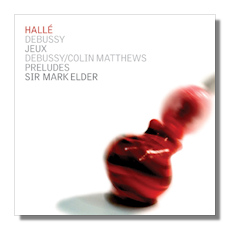
The Internet's Premier Classical Music Source
Related Links
- Debussy Reviews
- Latest Reviews
- More Reviews
-
By Composer
-
Collections
DVD & Blu-ray
Books
Concert Reviews
Articles/Interviews
Software
Audio
Search Amazon
Recommended Links
Site News
 CD Review
CD Review
Claude Debussy

Piano Works
Arranged for Orchestra by Colin Matthews
- Poeme Danse "Jeux"
- 12 Préludes
- Danseuses de Delphes (Book 1 #1)
- La sérénade interrompue (Book 1 #9)
- Des pas sur la neige (Book 1 #6)
- Les fées sont d'exquises danseuses (Book 2 #4)
- Voiles (Book 1 #2)
- Hommage à S. Pickwick Esq. P.P.M.P.C. (Book 2 #9)
- La terrasse des audiences du clair de lune (Book 2 #7)
- Bruyères (Book 2 #5)
- Ondine (Book 2 #8)
- Les collines d'Anacapri (Book 1 #5)
- Feux d'artifice (Book 2 #12)
- La cathédrale engloutie (Book 1 #10)
- Colin Matthews: Postlude "Monsieur Croche"
Hallé Orchestra/Mark Elder
AS&V Hallé CDHLL7518 74m DDD
Debussy once remarked "that the beauty of a work of art will always be a mystery that is to say that one will never be able to work out how it's done". There is no better example of this truth than Debussy's own Preludes, composed for piano in two books of 12 each in 1910 and 1912.
For nearly a century these superb miniatures have entranced listeners with their beauty, magically evoking sights, sounds and even scents by means of nothing more than what the composer called "that box of hammers and strings". The amazement of Colin Matthews' orchestral arrangements of the 24 Preludes is that it seems that he succeeded in revealing exactly "how it's done".
Commissioned by Mark Elder in 2001, the composer did not offer a note-for-note transcription but sought to unearth the secret of each piece and in most instances translated it faithfully, if not literally into orchestral terms. I found this groundbreaking venture fascinatingly interesting and somehow the original pieces seemed to shine more glowingly in all their dazzling tone painting. The postlude, "Monsieur Croche" is a Matthews original and its tonal language fits perfectly with the rest of the transcriptions.
The disc includes a delightfully detailed version of "Jeux", a commission by Diaghilev for his "Ballet Russes". One of Debussy's best creations, the piece has never caught the public imagination and to this day it remains in the shadows of such works as "La Mer" and "Prélude à l'après-midi d'un faune". Elder and his Hallé forces perform with character and feeling and their wholehearted commitment to both composers is exemplary.
Copyright © 2009, Gerald Fenech




















